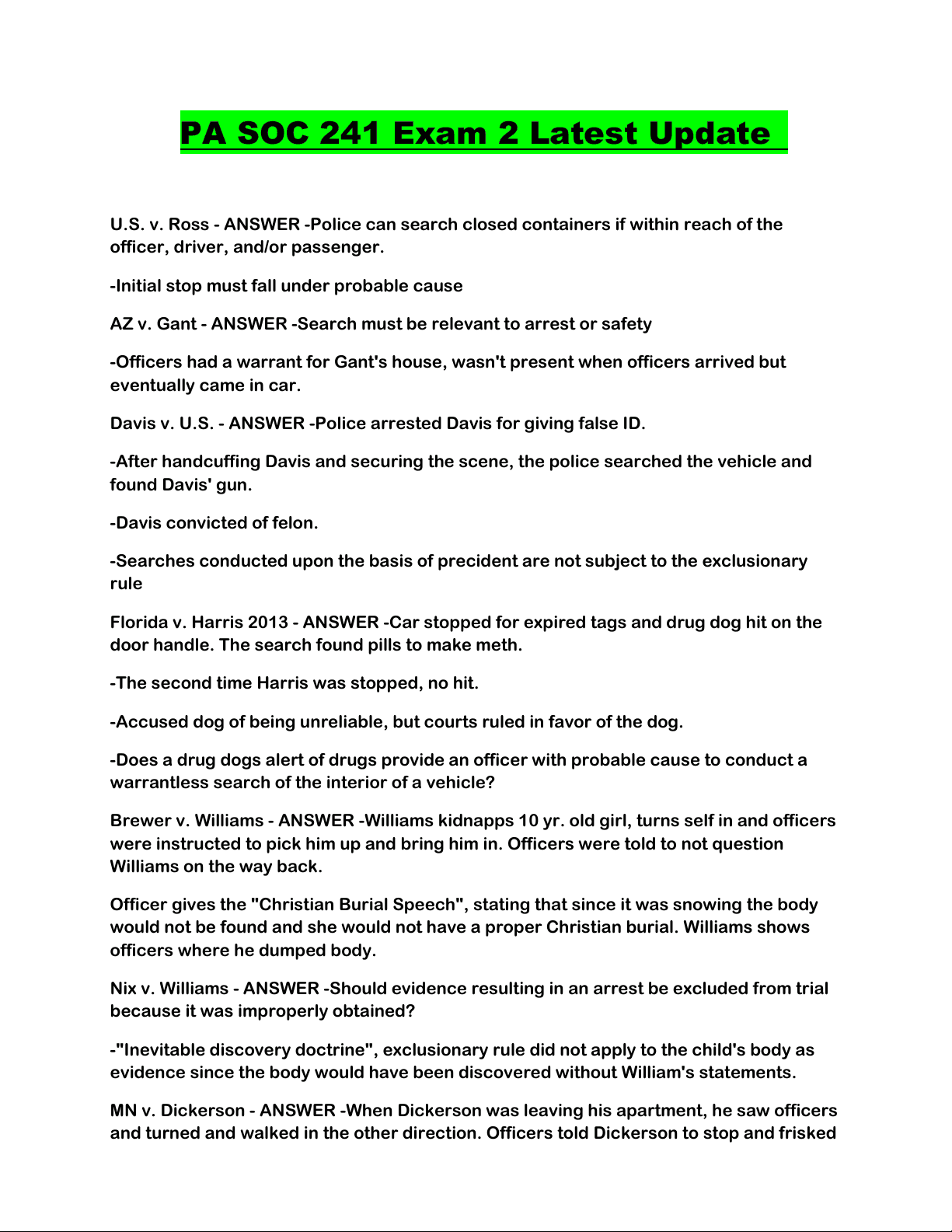
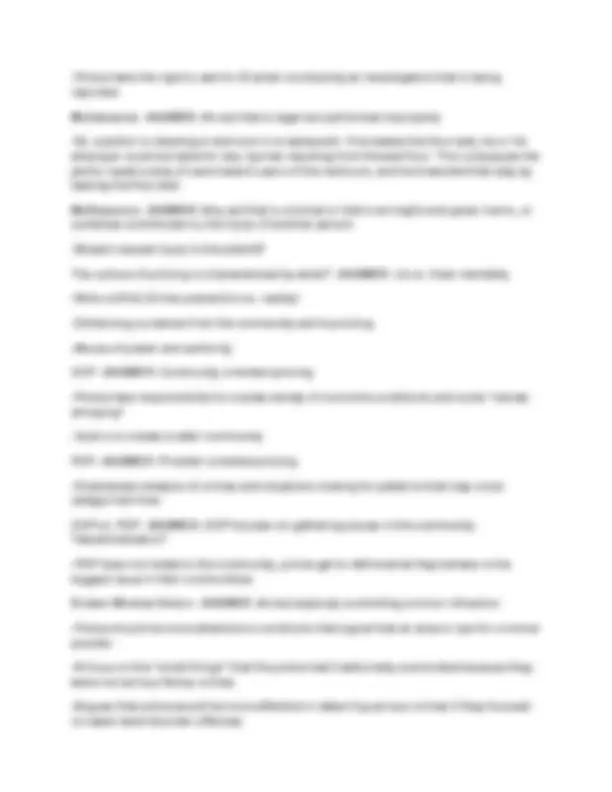
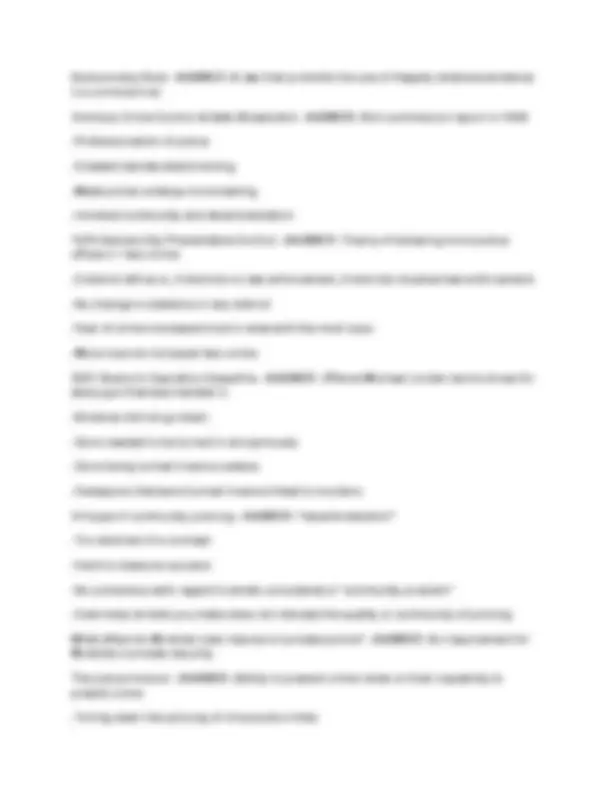
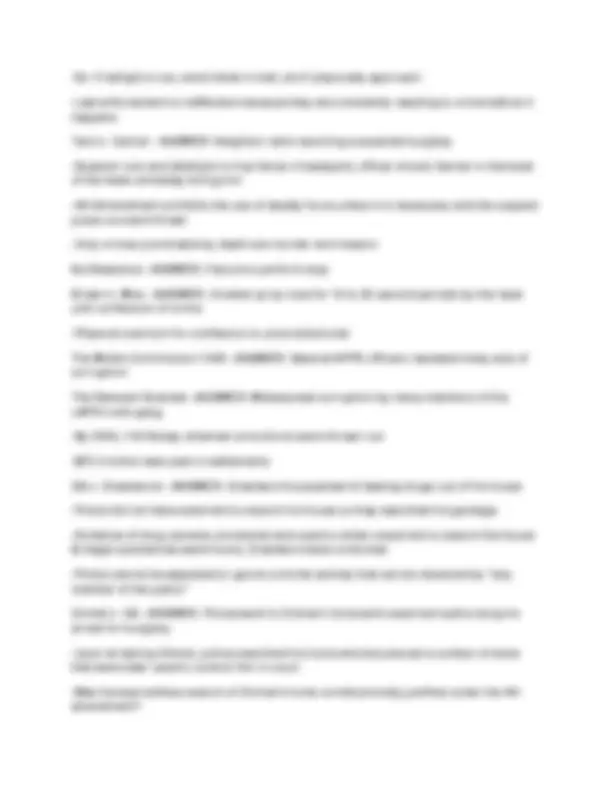
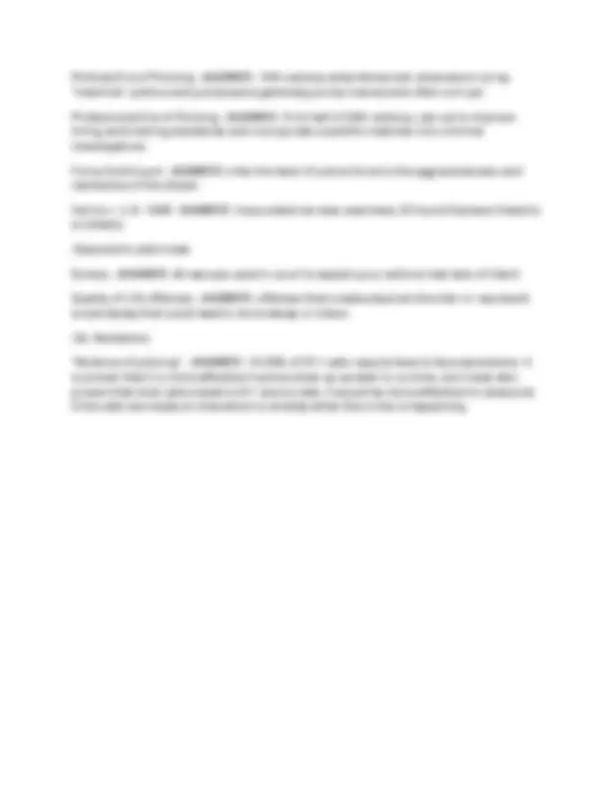


Study with the several resources on Docsity

Earn points by helping other students or get them with a premium plan


Prepare for your exams
Study with the several resources on Docsity

Earn points to download
Earn points by helping other students or get them with a premium plan
Community
Ask the community for help and clear up your study doubts
Discover the best universities in your country according to Docsity users
Free resources
Download our free guides on studying techniques, anxiety management strategies, and thesis advice from Docsity tutors
PA SOC 241 Exam 2 Latest Update
Typology: Exams
1 / 8

This page cannot be seen from the preview
Don't miss anything!





U.S. v. Ross - ANSWER -Police can search closed containers if within reach of the officer, driver, and/or passenger. -Initial stop must fall under probable cause AZ v. Gant - ANSWER -Search must be relevant to arrest or safety -Officers had a warrant for Gant's house, wasn't present when officers arrived but eventually came in car. Davis v. U.S. - ANSWER -Police arrested Davis for giving false ID. -After handcuffing Davis and securing the scene, the police searched the vehicle and found Davis' gun. -Davis convicted of felon. -Searches conducted upon the basis of precident are not subject to the exclusionary rule Florida v. Harris 2013 - ANSWER -Car stopped for expired tags and drug dog hit on the door handle. The search found pills to make meth. -The second time Harris was stopped, no hit. -Accused dog of being unreliable, but courts ruled in favor of the dog. -Does a drug dogs alert of drugs provide an officer with probable cause to conduct a warrantless search of the interior of a vehicle? Brewer v. Williams - ANSWER -Williams kidnapps 10 yr. old girl, turns self in and officers were instructed to pick him up and bring him in. Officers were told to not question Williams on the way back. Officer gives the "Christian Burial Speech", stating that since it was snowing the body would not be found and she would not have a proper Christian burial. Williams shows officers where he dumped body. Nix v. Williams - ANSWER -Should evidence resulting in an arrest be excluded from trial because it was improperly obtained? -"Inevitable discovery doctrine", exclusionary rule did not apply to the child's body as evidence since the body would have been discovered without William's statements. MN v. Dickerson - ANSWER -When Dickerson was leaving his apartment, he saw officers and turned and walked in the other direction. Officers told Dickerson to stop and frisked
him. Officer patted him down and felt a lump in his pocket, lump was cocaine & was charged with possession of an illegal substance. -Dickerson requested that cocaine was excluded in your, request was denied and he was found guilty. -Sense of touch is sometimes equivalent to the sense of sight -Plain feel Royer v. Florida - ANSWER -DEA matches Royer with a Drug Courier profile -Stops Royer, asks questions, no matching ID -DEA asks Royer to come with them for questions. Royer complies. -DEA asks to search Royer & his bags, he complies, drugs are found and he is read his Miranda rights. -Under arrest when his ID did not match his plane ticket, probable cause. -Police deprive of freedom, suspect is self aware they are no longer free to leave. -Probable cause exists -Defined lawful arrest Terry v. Ohio - ANSWER -Suspects danger -Officer observed three men and approached and frisked them. Found weapons and convicted Terry for carrying a concealed weapon. -Threat presented to officer's safety while he was investigating suspicious behavior Rogers v. AZ - ANSWER -Rogers and friend were observing traffic stop from 50 ft. away. -Officers observed and demanded ID, both run and Rogers was caught. -Officers pat Rogers down and discover cocaine & convict Rogers. -State Supreme Court ruled that police need articulable reason to believe criminal activity is occurring, otherwise search is illegal. Hiibel v. Nevada - ANSWER -Call made to police about suspicious truck on the side of the road -Police respond and ask driver for ID, Hiibel refuses to provide ID -Arrested for inhibiting police investigation -Appealed based on 4th, 5th, 14th Amendment
Exclusionary Rule - ANSWER -A law that prohibits the use of illegally obtained evidence in a criminal trial. Omnibus Crime Control & Safe Streets Act - ANSWER -Riot commission report in 1968 -Professionalism of police -Created standardized training -Made police undergo more testing -Involved community and decentralization 1974 Kansas City Preventative Control - ANSWER -Theory of believing more police officers = less crime. -5 district left as is, 5 districts no law enforcement, 5 districts doubled law enforcement. -No change in statistics in any district -Fear of crime increased most in area with the most cops. -More cops do not equal less crime. 2001 Boston's Operation Ceasefire - ANSWER -Offered Michael Jordan tennis shoes for every gun that was handed in. -Violence did not go down -Guns needed to be turned in anonymously -Guns being turned in were useless -3 weapons that were turned in were linked to murders. Critique of community policing - ANSWER -decentralization -Too abstract of a concept -Hard to measure success -No consensus with regard to whats considered a "community problem" -How many arrests you make does not indicate the quality or community of policing What effect do Miranda rules impose on private police? - ANSWER -No requirement for Miranda in private security. The police mission - ANSWER -Ability to prevent crime relies on their capability to predict crime -Toning down the policing of minuscule crimes
-Ex: If taillight is out, send ticket in mail, don't physically approach -Law enforcement is ineffective because they are constantly reacting to crime before it happens Tenn v. Garner - ANSWER -Neighbor calls reporting suspected burglary -Suspect runs and attempts to hop fence in backyard, officer shoots Garner in the back of the head ultimately killing him -4th Amendment prohibits the use of deadly force unless it is necessary and the suspect poses a violent threat -Only crimes punishable by death are murder and treason Nonfeasance - ANSWER -Failure to perform duty Brown v. Miss - ANSWER -Hoisted up by rope for 15 to 20 second periods by the neck until confession of crime -Physical coercion for confession is unconstitutional The Mollen Commission 1993 - ANSWER -Several NYPD officers revealed many acts of corruption The Rampart Scandal - ANSWER -Widespread corruption by many members of the LAPD's anti gang -By 2000, 100 falsely obtained convictions were thrown out -$70.2 million was paid in settlements CA v. Greenword - ANSWER -Greenword suspected of dealing drugs out of his house -Police did not have a warrant to search his house so they searched his garbage -Evidence of drug use was uncovered and used to obtain a warrant to search the house & illegal substances were found, Greenword was convicted -Police cannot be expected to ignore criminal activity that can be observed by "any member of the public" Chimel v. CA - ANSWER -Police went to Chimel's home with a warrant authorizing his arrest for burglary. -Upon arresting Chimel, police searched his home and discovered a number of items that were later used to convict him in court. -Was the warrantless search of Chimel's home constitutionally justified under the 4th amendment?
access at the time to the cocaine that the officer needed a warrant to search -Extends the Chimmel rule Chimel Rule - ANSWER -The Court held that police officers arresting a person at home could not search the entire home without a search warrant, but police may search the area within immediate reach of the person. -Chimel v. CA 1969 Davis v. U.S. - ANSWER -Does the good-faith exception to the exclusionary rule apply to a search that was authorized by precedent at the time of the search but is subsequently ruled unconstitutional? -Davis gave false name to police, was later arrested and handcuffed and placed into cop car. Police searched his car and found an illegal weapon -Sentenced to 220 months in prison FL v. Jardines - ANSWER -Cops received a crime tip that Jardines was using his house to grow marijuana. -Cops went to Jardine's house with a drug dog who got a hit on the front door for marijuana. -Officer then wrote an affidavit for a search warrant which was issued. House was searched and marijuana was found. -Jardines argued that the dog was impermissible under the 4th amendment. -Majority opinion ruled that the officers conducted an unlawful search violating the 4th amendment FL v. Bostik - ANSWER -Officers boarded bus and without articulable reason questioned him & asked to search his bags. -Found cocaine & arrested Bostik -The Sheriffs practice of "working the buses" was unconstitutional Per Se Rule - ANSWER -The act is inherently illegal. An act is illegal without extrinsic proof. -Acts are made per se by statue, constitution, or case law Clapper v. Amnesty International 2012 - ANSWER -No one can sue the government over secret surveillance because since it's secret, no one can prove his or her calls were intercepted Discretion (Brown 1981) - ANSWER -The police may use force to ensure that the law is obeyed and public order is preserved.
Political Era of Policing - ANSWER -19th century when American cities were run by "machine" politics and police were generally poorly trained and often corrupt. Professional Era of Policing - ANSWER -First half of 20th century, set out to improve hiring and training standards and incorporate scientific methods into criminal investigations. Force Continuum - ANSWER Links the level of police force to the aggressiveness and resistance of the citizen. Harris v. U.S. 1968 - ANSWER -Impounded car was searched, ID found that was linked to a robbery. -Exposed to plain view Duress - ANSWER -An excuse used in court to explain your actions had lack of intent. Quality of Life offenses - ANSWER -offenses that create physical disorder or represent social decay that could lead to more decay or chaos. -Ex: Vandalism "Science of policing" - ANSWER -10-20% of 911 calls require face to face assistance. It is proven that it is more effective if police show up quicker to a crime, but it was also proven that most calls made to 911 are too late; it would be more effective for everyone if the calls are made on time which is directly when the crime is happening.